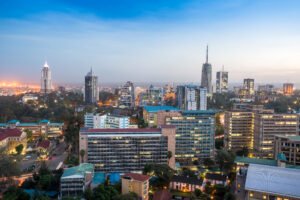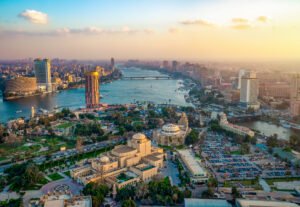So, imagine a document that gives you access to 54 countries with diverse economies, population sizes and demographic makeup. This opportunity becomes even more exhilarating when you’re an entrepreneur or a specialist in your field, possessing a passport that opens doors across an entire continent. This is the possibility that is open before me and my children because we are Sierra Leoneans looking at returning to the continent. The anticipation is growing as an increasing number of African nations, including recent additions, Rwanda and Kenya, are extending visa-free travel to us. This development is adding to the excitement and ease of exploring opportunities across the continent.
The African Continental Free Trade Area (AfCFTA) represents far more than a mere economic pact. In my eyes, it’s a powerful summons to the African diaspora, calling us back to play an instrumental role in shaping Africa’s future. By transforming the continent into a unified market, AfCFTA is unlocking doors to trade and investment opportunities that were previously unimaginable. For those of us in the diaspora, it extends beyond the realm of policy; it is the perfect invitation to move to and contribute to the continent’s prosperity and progress, marking the beginning of a new chapter filled with promise and potential.
AfCFTA aims to reduce trade barriers, harmonize standards, and facilitate the free movement of goods and services across 54 countries. For the diaspora, this presents a unique opportunity to leverage our global experiences and contribute to Africa’s economic renaissance. This landmark initiative is more than just a trade agreement, it is a transformative movement to reshape the continent’s role in the global economy. Africa represents nearly a fifth of the world population but accounts for just over 2% of world trade. Most of that trade has been from the extractive industries and there has been very little value addition meaning very little job creation.
A significant challenge facing Africa is the limited amount of intra-continental trade. Currently, less than 20% of trade takes place within the African Union, highlighting a missed opportunity for economic collaboration among African nations.
The African Continental Free Trade Area (AfCFTA) is poised to revolutionize this situation. By facilitating easier trade and cooperation between African countries. AfCFTA aims to dramatically increase the percentage of trade happening within the continent, fostering greater economic unity and prosperity across Africa.
For many in the diaspora, AfCFTA can be a bridge to a land rich with untapped potential. It opens up a market that is now the largest free trade area in the world since the formation of the World Trade Organization. This integration means access to over 1.3 billion people across a diverse and dynamic continent, presenting a mosaic of opportunities in sectors ranging from technology and agriculture to manufacturing and services. For entrepreneurs and investors, this is a fertile ground for innovation and growth, where their expertise and capital can make a significant impact.
The diaspora, equipped with global insights and experiences, are uniquely positioned to act as catalysts for change and development within this new framework. Our understanding of international business practices, combined with a deep cultural connection to the continent, makes us ideal partners in driving forward Africa’s economic agenda. We can introduce new technologies, business models and strategies that are essential for modern enterprises, thereby fostering a more competitive and resilient African economy.
Moreover, AfCFTA’s emphasis on free movement of people and goods is a game-changer. It eases the barriers that have historically hindered intra-African trade and mobility. For the diaspora, this means reduced hurdles in setting up businesses, easier access to a pan-African talent pool and the ability to create products and services that cater to a diverse but interconnected market.
Beyond the economic benefits, there is a profound emotional and cultural dimension to the diaspora’s engagement with AfCFTA. For those who have never visited the continent, AfCFTA can offer an easier pathway to reconnect with your roots, understand your heritage and contribute to the narrative of a rising Africa. It’s an invitation to be part of a story that goes beyond individual success, one that includes uplifting communities and shaping the future of the continent.
In essence, the allure of AfCFTA for the African diaspora lies not only in the tangible for business and trade but also a chance to be part of a larger, collective effort to drive Africa towards a future of prosperity and interconnectedness. It’s a call to go home, to invest not just in economies, but in the people and the rich tapestry of cultures that make up our vast, vibrant continent.
Making the Move: Practical Steps for the Diaspora
The possibilities of AfCFTA excite me and are some of the reasons I have decided that a move to the continent in the next 18 months is imperative. Moving to the continent will be life-changing for me and my children because I hope this is my forever move; setting the stage for a new chapter in our lives. It, therefore, requires careful planning, strategic thinking and a deep understanding of both the opportunities and challenges that lie ahead. Here are some practical steps that I am taking in this journey:
1. In-Depth Research and Understanding of AfCFTA: Before embarking on this venture, it is crucial to comprehend the legal and economic implications of AfCFTA. So I am spending my days learning about tariff schedules, trade regulations and market dynamics in specific countries. Understanding the nuances of AfCFTA will aid in making informed decisions and identifying where the best opportunities lie.
2. Identifying Market Opportunities: My research looks at specific industries and sectors that will thrive under AfCFTA and I am looking for areas where my skills and experience can offer a competitive advantage or fulfil a market need. My focus is on sectors that are poised for growth and can benefit from the expertise and innovation that I can bring.
3. Building a Robust Network: Networking is key in many business ventures but more so in a diverse and complex market like Africa. I am engaging with other business professionals, industry groups and local communities both online and offline. I am also participating in African business forums, webinars and local events that provide valuable insights and connections.
4. Financial Planning and Management: The primary challenge that many returnees encounter is inadequate financial planning which is a critical aspect of successfully relocating and establishing businesses on the continent. Ensuring adequate funding for both the relocation process and subsequent business operations is essential.
For the Long Term
Equally important is gaining a thorough understanding of the local tax, banking and financial landscapes, along with effectively managing the risks associated with currency fluctuations.
My long-term strategy includes consulting with legal and professional experts to navigate through the intricate legal and regulatory frameworks of my eventual home country and the countries I’ll do business in.
Although I grew up in Sierra Leone, I suspect I will need to relearn and adapt to local cultures and business practices of the country I relocate to or do business in. Cultural integration will not only help in my personal life but it will be important in understanding consumer behaviour and building trust in business.
I hope that this brief overview of AfCFTA has provided you with a glimpse into the emerging opportunities and underscored why I believe relocating to the continent in the next 18 months is an excellent decision.
Stay tuned for the next edition where we’ll continue to explore the vast array of opportunities that AfCFTA brings to the African continent and its diaspora. Until then, let’s keep the conversation going. I look forward to hearing your thoughts!



